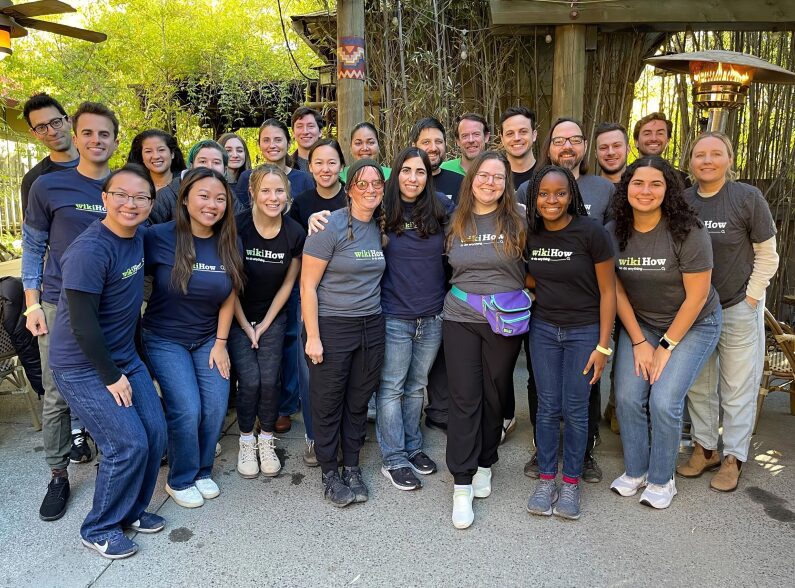Elizabeth Douglas is currently the CEO of wikiHow.com, the world’s largest how-to website. Driven by wikiHow’s mission to reach everyone on the planet, Elizabeth collaborates with her teams to create innovative solutions for growing and scaling wikiHow. Under Elizabeth’s leadership, wikiHow has grown over 1500%, and today is visited by more than 115 million people every month across 230 countries and territories. Elizabeth holds a Bachelor’s degree in Computer Science from Stanford, as well as an MBA from Stanford’s Graduate School of Business.
Company: wikiHow
We are thrilled to have you join us today, welcome to ValiantCEO Magazine’s exclusive interview! Let’s start off with a little introduction. Tell our readers a bit about yourself and your company
Elizabeth Douglas: Thank you for having me today. I’m Elizabeth Douglas, the CEO of wikiHow and a former software engineer. My passion for creating products that help people lead better lives has guided my journey to leading wikiHow, where I continue to focus on making a positive impact.
wikiHow is the Internet’s largest how-to platform and a leader in instructional knowledge. Since our founding in 2005, we’ve been on a mission to teach people how to do anything, offering step-by-step guides across a wide range of topics. We’ve grown into a global platform, available in 18 languages, and are committed to providing reliable, trustworthy information. Our partnerships with organizations like the United Nations Foundation, Direct Relief, Amazon, Mental Health America, and Vote.org help ensure the accuracy and credibility of our content. Additionally, we collaborate with a vast network of over 1,000 experts who contribute their specialized knowledge to guarantee the highest level of expertise in every article.
Can you share a time when your business faced a significant challenge? How did you navigate through it?
Elizabeth Douglas: Covid was a challenging time for wikiHow, as we primarily operated in person before the pandemic. Our office culture was highly collaborative and people-centric, so transitioning to remote work required us to find new ways to preserve that sense of connection. To maintain our culture, we implemented a variety of virtual team events, more personal team meetings, and regular coffee chats and one-on-ones. Thanks to our small, close-knit team, we’ve successfully fostered the same collaborative spirit, even in a remote environment.
How has a failure or apparent failure set you up for later success?
Elizabeth Douglas: Failure, while uncomfortable, has always been an opportunity for growth in my experience. I make it a point to learn from my mistakes and demonstrate to my team that failure is part of the process. This mindset is deeply embedded in wikiHow’s culture, encouraging our team to take risks and explore new ideas. While not every risk pays off, some have led to breakthrough innovations for our business, such as the creation of quizzes or the wide expansion of our expert network. More importantly, I consider it a success when my team feels empowered to push boundaries, knowing that both wins and lessons learned are valuable outcomes.
How do you build a resilient team? What qualities do you look for in your team members?
Elizabeth Douglas: A resilient team starts with a strong company culture. At wikiHow, we’ve cultivated a supportive environment where collaboration takes priority over competition, and team members are truly invested in each other’s success. When challenges arise, employees know they have a reliable support system and trust that everything will work out.
To build resilience, we look for qualities like kindness, empathy, and humility—traits that foster strong relationships and teamwork. We also value a collaborative spirit and a commitment to wikiHow’s mission. These qualities help create a team that’s not only passionate about our mission in education but also capable of navigating challenges together, remaining adaptable, and staying focused on solutions. In this way, resilience becomes a natural outcome of the shared values and strong connections within the team.

How do you maintain your personal resilience during tough times?
Elizabeth Douglas: I believe challenges often happen for a reason and can lead to positive outcomes. Over the years, I’ve learned that tough times usually signal that something better is around the corner. This mindset helps me stay positive and resilient in the face of setbacks. For example, years ago, wikiHow experienced a significant drop in site traffic overnight, which was devastating at the time. However, this challenge led us to improve by incorporating an editing team and expert co-author process, ultimately making the site better for our users. Not only did we regain our traffic, but we continued to grow, becoming the world’s largest how-to site, powered not only by community, but also by a huge network of experts.
What strategies do you use to manage stress and maintain focus during a crisis?
Elizabeth Douglas: I make a conscious effort to compartmentalize as much as possible, ensuring that a stressful situation doesn’t spill over into other aspects of work or my life. By keeping things separate, I can minimize overall stress and stay focused on finding solutions. I also take time to step back and clear my mind by exercising, listening to relaxing music, or spending time with my dogs.
How do you communicate with your team during a crisis?
Elizabeth Douglas: In times of crisis, I prioritize transparency and honesty with my team. I typically address the crisis with the entire team and then follow up individually to answer questions and provide support. I try to make myself as available as possible for support and provide honest feedback and responses.
What advice would you give to other CEOs on building resilience in their organizations?
Elizabeth Douglas: To build resilience in your organization, it’s essential that your team trusts you as a leader. I would advise fellow CEOs to prioritize authentic communication and openness, as it’s the cornerstone of both business operations and company culture. When employees feel uncertain, their resilience can waver, but when they feel secure and trust is firmly established, they’re much more likely to remain resilient in the face of challenges.
How do you prepare your business for potential future crises?
Elizabeth Douglas: I prioritize having multiple different balls in the air at any given time. These include varied projects, goals, and priorities. This approach ensures that if one ball drops, I still have others in the air that hold potential. Crises typically affect only one ball at a time, which allows me to manage challenges without losing momentum.
What’s the most important lesson you’ve learned about leadership in times of crisis?
Elizabeth Douglas: I’ve learned that it’s important to have a big picture view of crises because they don’t last forever. Challenges are fleeting, people move on, and better days always lie ahead. While it can be tough to keep this mindset in the heat of the moment, focusing on the broader perspective can help you navigate through difficult times more effectively.






